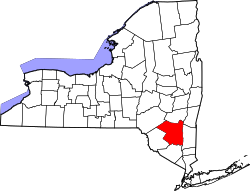History
The town of Lloyd was formed from the town of New Paltz, New York. It was created by an act of the New York State Legislature on April 15, 1845; the first town meeting was held three weeks later, on May 6. The first town officials were selected, including town supervisor Reuben Deyo, justices of the peace Silas Saxton, John B. Howell, and John L. Deyo, with Hasbrouck Lefevre as town clerk. [3]
In 2025, the town of Lloyd received negative media attention [4] [5] for a proposed pet crematorium located 200 feet away from Highland Elementary School. If approved, it would be the closest pet crematorium facility to a public school in New York State. [6] [7] Many residents have acknowledged that crematoriums are illegal [8] within the town limits of Lloyd, New York, calling into question the legality of an animal incineration factory next to a public school. [9] The pet crematorium was successfully nixed in August 2025. [10]
Geography
According to the United States Census Bureau, the town has a total area of 33.4 square miles (87 km2), of which 31.7 square miles (82 km2) is land and 1.6 square miles (4.1 km2) (4.91%) is water.
The eastern town line, marked by the Hudson River, is the border of Dutchess County, New York. Swarte Kill marks the western border of the town, dividing Lloyd from New Paltz.
The lowest point in the town is the shore of the Hudson River, which is at sea level. The highest point is the summit of Illinois Mountain, at 1,125 feet (343 m). [11] Illinois Mountain is part of the Marlboro Mountains, which bisect the town from north to south.
Demographics
Historical population| Census | Pop. | Note | %± |
|---|
| 1850 | 2,035 | | — |
|---|
| 1860 | 2,499 | | 22.8% |
|---|
| 1870 | 2,658 | | 6.4% |
|---|
| 1880 | 2,713 | | 2.1% |
|---|
| 1890 | 2,516 | | −7.3% |
|---|
| 1900 | 2,608 | | 3.7% |
|---|
| 1910 | 2,803 | | 7.5% |
|---|
| 1920 | 3,079 | | 9.8% |
|---|
| 1930 | 3,709 | | 20.5% |
|---|
| 1940 | 3,795 | | 2.3% |
|---|
| 1950 | 4,503 | | 18.7% |
|---|
| 1960 | 5,842 | | 29.7% |
|---|
| 1970 | 7,032 | | 20.4% |
|---|
| 1980 | 7,875 | | 12.0% |
|---|
| 1990 | 9,231 | | 17.2% |
|---|
| 2000 | 9,941 | | 7.7% |
|---|
| 2010 | 10,863 | | 9.3% |
|---|
| 2020 | 11,133 | | 2.5% |
|---|
|
As of the census [13] of 2000, there were 9,941 people, 3,626 households, and 2,429 families residing in the town. The population density was 313.3 inhabitants per square mile (121.0/km2). There were 3,818 housing units at an average density of 120.3 per square mile (46.4/km2). The racial makeup of the town was 90.29% White, 5.22% African American, 0.16% Native American, 1.22% Asian, 0.01% Pacific Islander, 1.30% from other races, and 1.80% from two or more races. Hispanic or Latino people of any race were 5.07% of the population.
There were 3,626 households, out of which 33.0% had children under the age of 18 living with them, 52.6% were married couples living together, 10.8% had a female householder with no husband present, and 33.0% were non-families. 25.0% of all households were made up of individuals, and 7.4% had someone living alone who was 65 years of age or older. The average household size was 2.54 and the average family size was 3.09.
In the town, the population was spread out, with 25.7% under the age of 18, 7.3% from 18 to 24, 30.0% from 25 to 44, 22.5% from 45 to 64, and 14.6% who were 65 years of age or older. The median age was 38 years. For every 100 females, there were 93.3 males. For every 100 females age 18 and over, there were 86.0 males.
The median income for a household in the town was $52,686, and the median income for a family was $61,584. Males had a median income of $40,774 versus $30,286 for females. The per capita income for the town was $22,299. About 5.1% of families and 7.3% of the population were below the poverty line, including 7.7% of those under age 18 and 10.2% of those age 65 or over.
As of the 2010 census, there were 10,863 people in the town. The racial makeup was 86.1% White, 6.4 African American, 0.2% Native American, 2.9% Asian, 0.0% Pacific Islander. Hispanic or Latino people of any race were 7.3%. [14]
This page is based on this
Wikipedia article Text is available under the
CC BY-SA 4.0 license; additional terms may apply.
Images, videos and audio are available under their respective licenses.

